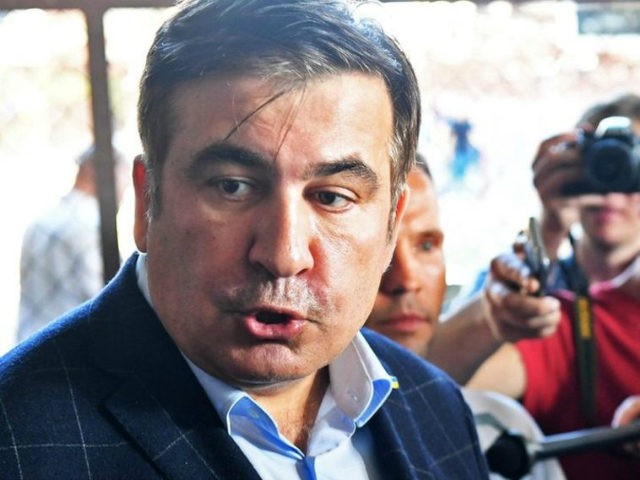Former Georgian President and Ukrainian Gov. Mikheil Saakashvili, exiled from Ukraine when current President Petro Poroshenko revoked his citizenship, re-entered the country on Sunday after a crowd of supporters pushed back border agents keeping him away.
Saakashvili lost his Georgian citizenship when Poroshenko, a former ally, granted him Ukrainian citizenship. As Poroshenko has revoked that citizenship, Saakashvili is technically stateless, though he contends that the revocation is illegal because international law prohibits stripping the citizenship of a person who would then become stateless.
Saakashvili attempted to enter Ukraine from Poland, where he used his Ukrainian passport to travel by train and bus into the country. He stands accused of criminal abuse of power by the pro-Russian government in Georgia and was expelled from Ukraine after resigning from the governorship of Odessa and founding a pro-American, anti-Russian populist party.
The former president first became an international icon after sounding the alarm on American television following the 2008 Russian invasion of two Georgian separatist regions, South Ossetia and Abkhazia, which currently remain in Russian control.
France24 reports that Saakashvili began his train ride into Ukraine Sunday flanked by a number of supporters and controversial political allies, including the anti-Russian former Ukrainian President Yulia Tymoshenko. The outlet describes the unfolding scene:
Saakashvili had tried to travel to the Ukrainian city of Lviv on a train, but it was held in a Polish city until he got off. He then traveled by bus to the Medyka-Shehyni border crossing, where he was allowed to pass through a Polish checkpoint on the border with Ukraine, but then temporarily blocked from reaching the Ukrainian checkpoint by a line of border guards standing arm-in-arm.
The former Georgian president broke through Ukrainian guards with the help of hundreds of supporters. Upon arriving in Lviv, where he remains, Saakashvili protested that his guards stole his Ukrainian passport, which he insists remains valid despite Poroshenko’s attempts to strip him of citizenship.
“I crossed the Polish border with a valid Ukrainian passport, the Poles stamped it,” Saakashvili told reporters according to Ukrainian outlet Unian. “When people brought me to Ukraine on their hands, I left my passport on the bus. The police came, searched the bus, and stole my passport. I have no idea where it is now.”
Saakashvili said the border guards refused to take his passport from him and stamp it to enter the country.
Poroshenko, meanwhile, told reporters that Saakashvili was a “criminal” for entering the country against the wishes of border patrol and would be dealt with as such. “I don’t care who breaks the state border: fighters in the east, or politicians in the west. There should be direct legal accountability,” Poroshenko said, according to the Kyiv Post.
“I hope [Saakashvili] will be just as eager to go to Georgia as he was to get into Ukraine,” Poroshenko added, an allusion to criminal charges the pro-Russian government in Tbilisi has leveled against him at home.
The Kyiv Post confirms that Saakashvili is currently in a hotel in Lviv, guarded by “about 70 fully uniformed soldiers of the Donbas battalion” who answer to Saakashvili allies.
Saakashvili, a veteran of Georgian politics, emerged in Ukrainian politics as Georgia’s president emeritus in 2015, when Poroshenko appointed him governor of Odessa. Saakashvili gave up his Georgian citizenship to take the job, where he rapidly began sweeping anti-corruption activities. He had been in Ukraine since 2012, after the rise of pro-Russian politicians in Georgia who charged him with abuse of power due to his imprisonment of Georgian opposition figures on corruption charges.
Saakashvili gave up the Odessa post in 2016, stating he could no longer serve under Poroshenko’s administration, which “capitalize[d] on the deaths of our soldiers,” he said, “who betrayed the idea of the Ukrainian revolution, and whose only motivation in life is to fill their pockets and strengthen their clans, and to rob Ukraine to the end.”
“Odessa will only develop once Kiev is freed from these corrupt politicians, who are sheltered by banditry and lawlessness,” he added, calling those in the government elite “corrupt filth.” He also announced the establishment of an anti-corruption, anti-elitist political party, “citing past praise by U.S. President-elect Donald Trump for his reforms.”
Poroshenko revoked Saakshvili’s citizenship in response.
“This passport is not the plaything of individual oligarchs, who issue it and then retract it, declare it invalid or use it to blackmail you,” Saakashvili recently protested, threatening he would return to Ukraine soon, speaking to Der Spiegel. “Poroshenko chose his friends based on who had money. I had none. As such, I cannot say that we were friends.”
Saakashvili’s attorneys argue that it is illegal for a nation to strip a citizen of their citizenship rights when this leaves the person stateless. According to the 1961 U.N. Convention on the Reduction of Statelessness, “If the law of a Contracting State entails loss of nationality as a consequence of any change in the personal status of a person … such loss shall be conditional upon possession or acquisition of another nationality.” Ukraine and Georgia are both signatories to this convention.
Saakashvili, who became governor of Odessa, Ukraine, under Poroshenko in part due to his performance keeping pro-Russians out of power in Georgia, has become a prominent leader for anti-Russian Ukrainians.
“We believe in the fact that Mikheil Saakashvili can lead our country out of the crisis,” supporter Lyudmyla Goretska told France24. “We see what he did in his own country (Georgia) and that’s enough for us.”
Another supporter told France24 she believed Saakashvili was the man to “finish the war” with Russia in the nation’s east, which continues years after Russian President Vladimir Putin annexed Ukraine’s Crimea peninsula.

COMMENTS
Please let us know if you're having issues with commenting.